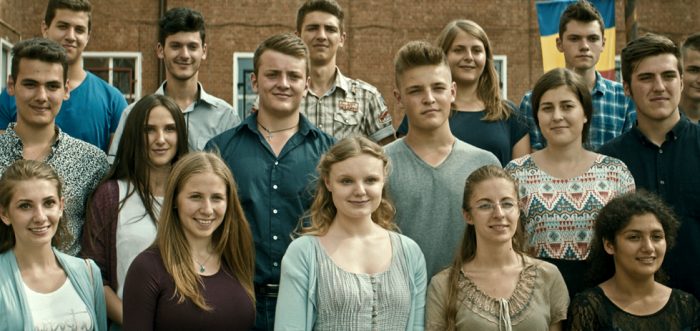![]()
Since 2014, Romania’s National Anticorruption Agency (DNA) has indicted over 2000 people — a group spanning ministers, magistrates, parliamentarians and mayors. The anticorruption momentum stalled in February this year, when Prime Minister Sorin Grindeau’s government passed an emergency decree decriminalising abuses of power in public office if damages fall under 200,000 lei (around US$47,000). In response, hundreds of thousands protested at Viktory Square in Central Bucharest, decrying the newly incumbent Grindeau in numbers unseen since the fall of communism in 1989.
In this narrative of social progress in Eastern Europe, pervasive corruption is framed as the bulwark against a hopeful future where democracy and the rule of law are legitimate and consequential. But in Graduation, Cristian Mungiu reminds us that there is no easy distinction — for some, channels of corruption secure their hopeful future, the only means of guaranteeing self-interest in a merciless playing field. The film’s premise is nothing notable — otherwise well-intentioned individuals succumb to wayward rules — nor does its unstylised “style” of social realism make for particularly memorable viewing, replete with long takes and static camera. It’s in Mungiu’s skillful structuring that his themes are given their complexity, through multiple threads that unravel at different rhythms.
The main story follows Romeo Aldea (Adrian Titieni), a middle-aged doctor whose hopes find vicarious expression through his star pupil daughter, Eliza (Maria-Victoria Dragus). After years abroad, he and his wife Magda (Lia Bugnar) returned to Cluj in 1991, post-Ceausescu deposition, but the youthful optimism that brought them back to Romania has atrophied into drawn-out disappointment. Events begin to snowball when Romeo drives Eliza to school the day before a major exam, but drops her off just shy of the entrance, where she is mugged and sexually assaulted. The trauma interferes with Eliza’s exam performance, jeopardising her conditional scholarship to Cambridge. With his hopes in a state of precarity, Romeo sets out to “fix” the situation by rigging her test scores. A policeman friend suggests speaking to a certain Mayor Bulai and bumping his name up on a waitlist for a liver transplant in exchange for Eliza’s guaranteed grades. Where Mungiu’s previous 4 Months, 3 Weeks and 2 Days (2007) invokes immediacy through ineluctable physicality, Graduation focuses on the aspirational, explored through the social mobility promised by academic success. Yet this film feels no less urgent, its future syntax filtered through a tense present.
Certain social instincts have yet to disappear with communism, their legacy enshrined in the normalisation of corruption. Mungiu humanises all the participants in the grade-altering scheme, minimising the gravity of their actions. Through his characters, Mungiu constantly reiterates the unpredictability of misfortune, and the ease with which it can be warped into a justification for back-alley dealings. The film opens with a static shot of the Aldeas’ living room, seconds of ominous quiet until a stone is tossed through the window, sending smashed glass all over the floor. Romeo walks into the frame holding a toothbrush, before running in pursuit of an unseen perpetrator, a figure only fleetingly visible until he vanishes behind a train. The scene functions as a kind of conceptual refrain, taking a backseat as the corruption drama unfolds, but remains a latent tension — it’s a seemingly random act to which premeditations must be attached and deciphered. In a country with so little state accountability, ambiguity is unbearable; actions must have perpetrators, and perpetrators, motivations. It’s telling that the starting point of Romeo’s actions is itself an extraordinary stroke of bad luck — Eliza’s assault. That the questionable Mayor Bulai needs a liver transplant is yet another stroke. It’s unfair that Romeo should bump up Bulai’s name on the transplant waitlist in exchange for Eliza’s scores, yet, as Mungiu’s characters contend, it’s unfair in the first place that Eliza can’t perform to her usual standard, and that Bulai is ill to the point of needing a transplant. As Bulai announces to Romeo, in an attempt at persuasion: “People should help each other!” — a proposition that seems innocent enough, but betrays how easily insidious intentions can be decontextualized as mutual assurance.
It’s clear that Romeo loves his daughter, but his actions reveal more than just standard parental concern, and even more than just the vicarious fulfilment of twilight aspirations. This is a character whose dream of his daughter’s westward escape becomes a foundational constituent of his identity. In a film like Graduation, it would make sense to stress the futility of hope but Mungiu emphasises its fantasy-sustaining force. Romeo’s alienated wife, Magda, is beset by a deadened complacency that reads as the more confronting, despairing perspective, even though her position extricates her from the moral quagmire. Would it be better to want things that demand compromise? Without an immovable faith in the yet-to-be, she is the weary pessimist to Romeo’s desperate but purposeful optimist.
These counterpointed expectations are never reconciled — even Eliza has doubts about studying abroad, as she grows more and more attached to her biker boyfriend. The multidirectional pull of these various desires is an effective parallel for the context Mungiu seeks to critique — freedom from institutionalised corruption can only come about through collective effort, but orchestration is near impossible when everyone wants freedom for different reasons.
